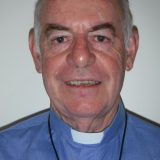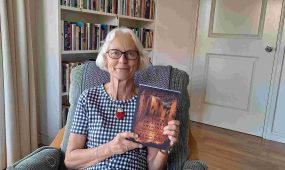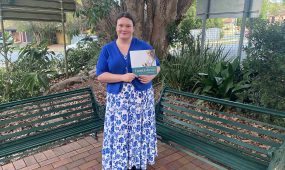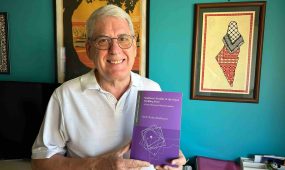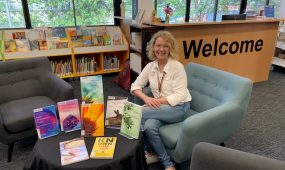The Forest Underground
Books & Guides
“Tony Rinaudo’s literally groundbreaking method of reforesting millions of hectares of land without planting a single tree was later named Farmer Managed Natural Regeneration,” says Chair of Angligreen, The Rev’d Peter Moore
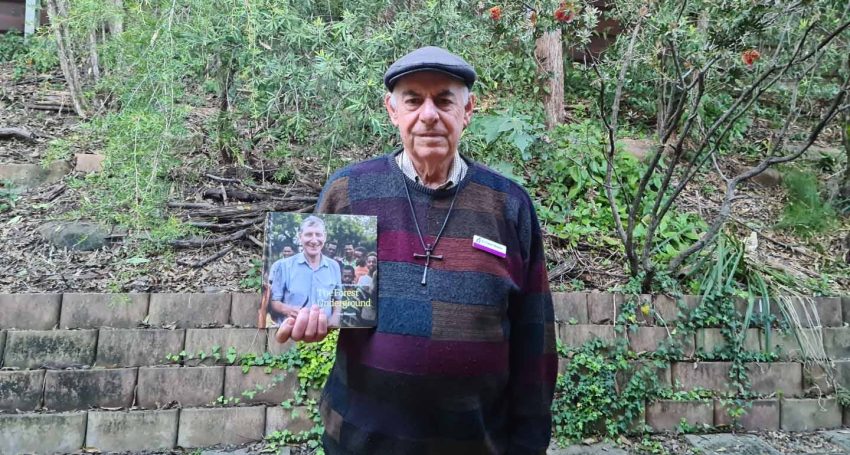
A journey of faith can bring many challenges, lead in unexpected directions and bear much fruit for a person and the communities a person lives in. The Forest Underground: Hope for a Planet in Crisis is an account of such a journey. It is a story of a young boy from a small country town in north-eastern Victoria near the treeless Murmungee Hills. This young boy sensed the hills’ grief and their cry for help and restoration. In his journey, God led him, his wife Liz and their children to development work with the Hausa people, managing a farm school and reversing land degradation and desertification in Niger.
Attempts at tree planting failed and famine was faced. However, Tony’s eyes were opened to the “forest underground”. The strategy developed, Farmer Managed Natural Regeneration (FMNR), is now considered the gold standard for such reforestation.
Tony’s book shows us that deforestation and abandoning agricultural biodiversity have had devastating impacts. As one farmer said about a tree in his field:
“This tree used to be my enemy. I burnt the stump every year to get rid of it. Since learning about the value of trees it has become my friend and I am so ashamed that I ever tried to destroy it.” (Rinaudo 2021, p.187).
The book is also an autobiographical account of Tony and Liz’s spiritual journey, as they commit to Christian service relying on God’s strength and guidance.
One key concept of the book is that nature itself will speak to us if we are receptive to it:
“At age 12, I was outraged to read that the Cuyahoga River in Ohio, USA, was so polluted it caught fire. Surely, this catastrophe would make world leaders pause and question their reckless pursuit of wealth and development without considering the environment – the scaffolding upon which all life on earth depends, But it didn’t. This shook what little confidence I had in the ability of government or industry to make wise decisions about the environment.” (Rinaudo 2021, p.31).
Advertisement
Rinaudo (2021, p.15) also shows appreciation for an Aboriginal approach to caring for Country by citing Victor Steffensen in Fire Country: How Indigenous Fire Management Could Help Save Australia (2020, p.126), describing pre-colonisation landscapes as “beautiful with plentiful food, medicines and life”.
A further key concept that Rinaudo explores is that God is real and answers prayer. Tony attends the University of New England to study for a four-year Bachelor of Rural Science. As a university student, away from home unsettled and anxious about land degradation and unnecessary human suffering, he wanted to complete his education, describing how he just wanted get out there to make a difference (Rinaudo 2021, p.39).
While at university he kept being drawn to the scripture, “Ask and it will be given to you; seek and you will find; knock and the door will be opened to you”:
“I asked myself, if this verse is true, why am I suffering? Why am I miserable? Finally, in frustration, I cried out to God. ‘If your word is true, if you are all-powerful and if you answer prayer, then help me. And I will go wherever you call me. But if you are not what your word says, if you do not answer prayer, then I am just being a hypocrite calling myself a Christian, and I will stop pretending.’…a deep sense of peace and assurance came over me. I sensed that I was not alone, that God did answer prayer and that he was already helping me.” (Rinaudo 2021, p.39)
Advertisement
Tony found similar assurances and guidance throughout his life. He was guided to missionary service with SIM (Sudan Interior Mission, later renamed Serving in Mission). During the lengthy preparation for service, Tony meets Liz who is also preparing for service with SIM. They marry and have their first child. SIM sends them to Niger with a very young baby believing that is where God is leading.
They are led to challenge the current farming and reforestation methods, scientific advice and government policies, because they are expensive and unsuccessful. While Tony is frustrated by the lack of success in planting seedlings and the high cost of such an approach, a bush on the side of the road caught his attention:
“Thinking that bushes scattered across the landscape were just shrubs or weeds I had never given them a second thought. I walked over and took a closer look…This was not a bush. These leaves belonged to a tree. It had been cut down, and I was looking at shoots sprouting a stump. These ‘bushes’ were, in fact, dormant trees – ready and waiting to recolonise the land. I was surrounded by trees. I was standing on a subterranean forest. In that instant everything changed. This was the answer to my prayer.” (Rinaudo 2021, p.107).
In 1983 work began in a dozen village communities. The team taught farmers how to select, prune and manage these “bushes” to recreate agroforestry parklands. Only one or two farmers in each of these villages were initially willing to try this new method, but:
“After just a few months, it was obvious that this technique was working. It was cheaper, easier and more successful than tree planting. Despite all the efforts, most transplanted seedlings died. With this method there was near 100% survival rate!” (Rinaudo 2021, p.110)
The effectiveness of this reforestation method is well described in The Forest Underground and the results have been confirmed. This is clearly an effective pathway to reforestation.
Changes are always difficult. The farmers resist changing their approach even though they had many failed harvests due to drought, which led to famine and people abandoning their farms and moving to neighbouring Nigeria. During the drought of 1984, dunes took over abandoned villages and the situation is critical.
Tony Rinaudo’s literally groundbreaking method of reforesting millions of hectares of land without planting a single tree was later named Farmer Managed Natural Regeneration (FMNR). It took a disaster, a food-for-work program and many challenges before it was recognised and adopted as a gold standard for reforestation:
“The very things which made FMNR successful have been stumbling blocks to some. Because FMNR is low cost, it has been perceived as cheap and second rate. Because it is farmer managed, it has been interpreted as unscientific, backward and haphazard. Because the species of trees we regenerated were indigenous, FMNR was often seen as wild, indiscriminate and inferior, However, these shallow perceptions about FMNR quickly melted away, not just because of the significant empirical impacts, but more compellingly because of the enthusiasm and energy of those directly affected. People liberated from debilitating poverty and hunger now had agency to create a better future for their families and become powerful advocates.’ (Rinaudo 2021, p.178)
Rinaudo (2021 p.172) recounts how Chris Reij, a human geographer from Vrije University, Netherlands said:
“FMNR has now spread across over half the cultivated land in Niger…what had happened in Niger and neighbouring countries was the biggest positive environmental change in the Sahel, if not all of Africa…This story needs to be told.”
In September 2004, Reij’s findings were verified by Gray Tappan from the US Geographical Survey through satellite photos.
Tony Rinaudo relates his personal story in a great amount of detail with compelling anecdotes, and is well documented with references and footnotes. It is a very convincing account of the practical and spiritual challenges of service side-by-side with an honest account of the complexities of moving in outside one’s comfort zone and culture. Listening to the land and listening to God led to healing of the land. Faithfulness has led to a significant contribution to the lives of others and, in this case, also to the planet.
Reading this book has confirmed my view that allowing regrowth of Indigenous trees is the best way to provide habitat and promote biodiversity. To some extent my wife, Alison, and I have done this in our own garden. I recommend this book to Anglicans and all Christians, both for information about the importance of reforestation and allowing regrowth of Indigenous native species. The Forest Underground also offers an authentic example of Christians living under difficult conditions, while still being open to hearing the intertwined voices of Country and of God.
Rinaudo, T. 2021, The Forest Underground: Hope for a Planet in Crisis. ISCAST, Forest Hill, Victoria.
Editor’s note: Tony Rinaudo’s inspiring story is told in The Forest Underground: Hope for a Planet in Crisis, which has been shortlisted for Australian Christian Book of The Year for 2022. Tony Rinaudo’s book can be purchased online and in good book stores.
Schools Tree Day will be celebrated on Friday 29 July and National Tree Day will be celebrated on Sunday 30 July. Visit the National Tree Day website for more information and resources.

